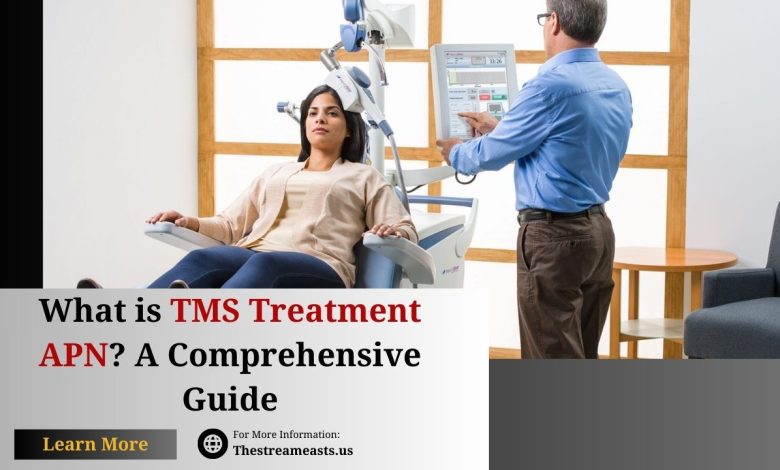What is TMS Treatment APN? A Comprehensive Guide

TMS treatment APN is a non-invasive procedure for depression. It uses magnetic fields to stimulate brain regions. Administered by an Advanced Practice Nurse, it ensures safety. TMS treatment APN is effective for treatment-resistant depression patients.
The procedure involves placing a magnetic coil on the scalp. It generates pulses that stimulate nerve cells.
Sessions last about 30 to 60 minutes. TMS treatment APN has minimal side effects, like mild headaches. It does not require anesthesia, making it convenient. This treatment offers hope for those not responding to medication.
TMS treatment APN can significantly improve patients’ quality of life.
What is TMS Treatment APN?
Definition of TMS Treatment APN
TMS (Transcranial Magnetic Stimulation) treatment APN refers to the use of TMS therapy administered by an Advanced Practice Nurse (APN). This treatment involves using magnetic fields to stimulate specific areas of the brain associated with mood regulation.
TMS treatment APN is primarily used to treat major depressive disorder, especially in patients who have not responded to other treatments like medication and psychotherapy.
Mechanism of Action
TMS treatment APN works by placing a magnetic coil on the patient’s scalp, which generates magnetic pulses. These pulses stimulate nerve cells in the brain, particularly in the prefrontal cortex, an area linked to mood regulation.
This stimulation can help alleviate symptoms of depression by enhancing neuronal activity and improving communication between different parts of the brain.
How Does TMS Treatment Work?
Procedure Overview
TMS treatment APN involves several steps. During a typical session, the patient sits comfortably in a chair while the APN positions the magnetic coil on their scalp. The coil delivers repetitive magnetic pulses to targeted brain regions.
Each session lasts about 30 to 60 minutes, and the treatment course usually spans several weeks, with sessions held five times a week.
Brain Stimulation Process
The magnetic pulses used in TMS treatment APN penetrate the skull and induce electrical currents in the brain tissue. These currents stimulate the nerve cells, promoting increased activity in brain regions that are underactive in depression. Over time, this increased activity can lead to a reduction in depressive symptoms and an improvement in overall mood.
What are the Benefits of TMS Treatment?
Effectiveness for Resistant Depression
One of the primary benefits of TMS treatment APN is its effectiveness in treating patients with treatment-resistant depression.
These are patients who have not responded to other forms of therapy, such as medication or psychotherapy. TMS offers a new avenue of hope for these individuals, providing significant symptom relief and improved quality of life.
Minimal Side Effects
TMS treatment APN is associated with minimal side effects compared to other treatments for depression. Common side effects, such as headaches and scalp discomfort, are generally mild and temporary.
Unlike other treatments, TMS does not require anesthesia, allowing patients to remain fully awake and alert during the procedure.
Are There Any Side Effects of TMS Treatment?
Common Side Effects
The most common side effects of TMS treatment APN include mild headache, scalp discomfort, and facial muscle twitching.
These side effects typically occur during or shortly after the treatment session and usually subside within a few hours. Most patients find these side effects to be manageable and not severe enough to discontinue treatment.
Rare but Serious Side Effects
Although rare, some patients may experience more serious side effects from TMS treatment APN. These can include seizures, which occur in less than 0.1% of patients. It is essential for patients to discuss any pre-existing conditions and potential risks with their healthcare provider before starting TMS treatment to ensure their safety.
Who Can Benefit from TMS Treatment?
Candidates for TMS Treatment
TMS treatment APN is suitable for patients with major depressive disorder who have not responded to other treatments. It is also being explored for use in other conditions, such as anxiety disorders, PTSD, and chronic pain.
A thorough evaluation by a healthcare provider is necessary to determine if a patient is a good candidate for TMS treatment.
Evaluation Process
Before starting TMS treatment APN, patients undergo a comprehensive evaluation that includes a review of their medical history, current symptoms, and previous treatment responses.
This evaluation helps the healthcare provider develop a personalized treatment plan and ensure that TMS is a safe and appropriate option for the patient.
What is the Role of an APN in TMS Treatment?
Administration of Treatment
An Advanced Practice Nurse (APN) plays a crucial role in administering TMS treatment. APNs are highly trained healthcare professionals who can perform various medical procedures, including TMS.
They are responsible for positioning the magnetic coil, setting the appropriate parameters, and monitoring the patient throughout the session to ensure safety and efficacy.
Patient Support and Education
APNs provide essential support and education to patients undergoing TMS treatment. They explain the procedure, address any concerns or questions, and provide guidance on what to expect during and after treatment.
APNs also monitor patients’ progress and make any necessary adjustments to the treatment plan to optimize outcomes.
How is Flight Status, Tracking, and Historical Data for C-FBWH Related to TMS Treatment?
Importance of Reliable Travel Information
For patients traveling to receive TMS treatment APN, reliable flight status and tracking information for flights like C-FBWH is crucial. This information helps patients plan their travel efficiently, ensuring they arrive on time for their treatment sessions.
Knowing the scheduled, estimated, and actual departure and arrival times can prevent travel disruptions and reduce stress.
Impact on Treatment Schedule
Timely and accurate flight data for C-FBWH can directly impact a patient’s treatment schedule. Delays or cancellations can affect the consistency of TMS treatment sessions, which is vital for achieving the best therapeutic outcomes.
Healthcare providers and patients can use historical flight data to choose the most reliable flights and minimize the risk of treatment interruptions.
How Can Patients Track Their Progress with TMS Treatment?
Symptom Monitoring Tools
Patients undergoing TMS treatment APN can use various tools to track their progress. These tools include standardized rating scales for depression, which help quantify changes in symptoms over time.
Patients can also keep a journal to document their mood, behavior, and any side effects they experience, providing valuable insights for their healthcare provider.
Regular Follow-Up Appointments
Regular follow-up appointments are an essential part of tracking progress with TMS treatment APN. During these appointments, the healthcare provider reviews the patient’s symptom changes, assesses their overall well-being, and makes any necessary adjustments to the treatment plan. These appointments ensure that the treatment is effective and address any emerging issues promptly.
What Should Patients Expect During TMS Treatment?
Initial Evaluation and Setup
Before starting TMS treatment APN, patients undergo an initial evaluation to determine the appropriate settings for the magnetic pulses. This evaluation includes identifying the exact location on the scalp where the magnetic coil will be placed and setting the intensity and frequency of the pulses.
The setup process ensures that the treatment is tailored to the patient’s specific needs.
During the Treatment Session
During a TMS treatment session, patients sit comfortably while the APN positions the magnetic coil on their scalp. The coil delivers magnetic pulses, creating a tapping sensation. Patients can relax, listen to music, or watch TV during the session, which typically lasts 30 to 60 minutes. After the session, patients can immediately resume their normal activities.
What is the Long-Term Outlook for Patients Receiving TMS Treatment?
Sustained Symptom Relief
Many patients experience significant improvements in their symptoms after completing a course of TMS treatment APN. These improvements can last for several months, providing sustained relief from depression.
Some patients may achieve complete remission, while others may continue to experience a reduction in the severity of their symptoms.
Maintenance and Follow-Up Care
To maintain the benefits of TMS treatment APN, some patients may require maintenance sessions. These sessions help sustain the therapeutic effects and prevent the recurrence of depressive symptoms.
Regular follow-up care with the healthcare provider ensures that any changes in symptoms are promptly addressed and that the treatment plan remains effective.
Pros and Cons of TMS Treatment
| Pros | Cons |
| Non-invasive | Mild side effects |
| Effective for resistant depression | Requires multiple sessions |
| Minimal downtime | Rare risk of seizures |
| No need for anesthesia | Cost may be high |
| Safe and well-tolerated | Not suitable for everyone |
Frequently Asked Questions
What is TMS treatment APN?
TMS treatment APN is a non-invasive procedure using magnetic fields to stimulate brain cells, administered by an Advanced Practice Nurse.
Who can provide TMS treatment?
An Advanced Practice Nurse (APN) can provide TMS treatment, ensuring safe and effective administration.
What are the common side effects of TMS treatment APN?
Common side effects include headache, scalp discomfort, and facial muscle tingling, which are usually mild and temporary.
How long does a TMS treatment session last?
A TMS treatment session typically lasts about 30 to 60 minutes, with patients remaining awake and alert.
Is TMS treatment APN effective for depression?
Yes, TMS treatment APN is effective, especially for patients who have not responded to other treatments, offering significant symptom relief.
Conclusion
In summary, TMS treatment APN provides a powerful option for those struggling with depression. This non-invasive therapy uses magnetic pulses to stimulate brain activity. Administered by an Advanced Practice Nurse, it offers a safe and effective solution.
With minimal side effects and no need for anesthesia, TMS treatment APN is a convenient choice.
It is particularly helpful for individuals who haven’t responded to other treatments. By improving brain function, TMS treatment APN can lead to significant improvements in mood and quality of life.
Overall, it represents a hopeful and accessible approach to managing severe depression.





